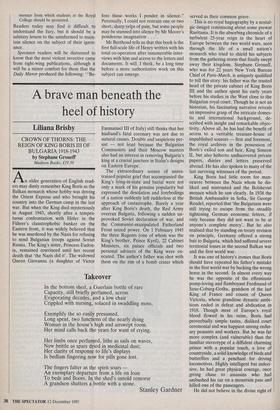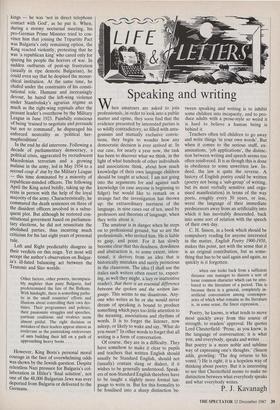A brave man beneath the heel of history
Liliana Brisby
CROWN OF THORNS: THE REIGN OF KING BORIS III OF BULGARIA 1918-1943 by Stephane Groueff Madison Books, £19.50 An older generation of English read- ers may dimly remember King Boris as the Balkan monarch whose hobby was driving the Orient Express and who brought his country into the German camp in the last war. But when the King died mysteriously in August 1943, shortly after a tempes- tuous confrontation with Hitler in the Fiihrer's claustrophobic bunker on the Eastern front, it was widely believed that he was murdered by the Nazis for refusing to send Bulgarian troops against Soviet Russia. The King's sister, Princess Eudox- ia, remained convinced until her recent death that 'the Nazis did it'. The widowed Queen Giovanna (a daughter of Victor Emmanuel III of Italy) still thinks that her husband's fatal coronary was not due to natural causes. Doubts and suspicions per- sist — not least because the Bulgarian Communists and their Moscow masters also had an interest in removing Bulgaria's king at a crucial juncture in Stalin's designs on Eastern Europe.
The extraordinary scenes of unres- trained popular grief that accompanied the King's lying-in-state and burial were not only a mark of his genuine popularity but expressed the desolation and forebodings of a nation suddenly left rudderless at the approach of castastrophe. Barely a year after King Boris's death, the Red Army overran Bulgaria, following a sudden un- provoked Soviet declaration of war, and the Communist-manipulated Fatherland Front seized power. On 1 February 1945 the three Regents (one of whom was the King's brother, Prince Kyril), 22 Cabinet Ministers, six palace officials and two personal advisers of the King were ex- ecuted. The author's father was shot with them on the rim of a bomb crater which served as their common grave.
This is no royal hagiography by a nostal- gic dmigre reminiscing about some prewar Ruritania. It is the absorbing chronicle of a turbulent 25-year reign in the heart of Europe between the two world wars, seen through the life of a small nation's monarch who tried to shield his subjects from the gathering storm that finally swept away their kingdom. Stephane Groueff, who was for 22 years New York Bureau Chief of Paris-Match, is uniquely qualified to tell this story: his father was the trusted head of the private cabinet of King Boris III and the author spent his early years before his studies in the West close to the Bulgarian royal court. Though he is not an historian, his fascinating narrative reveals an impressive grasp of the intricate domes- tic and international background, de- scribed with insight and remarkable objec- tivity. Above all, he has had the benefit of access to a veritable treasure-house of unpublished sources — first and foremost, the royal archives in the possession of Boris's exiled son and heir, King Simeon II, but also hitherto undiscovered private papers, diaries and letters preserved abroad. He has also spoken to many of the last surviving witnesses of the period.
King Boris had little room for man- oeuvre between the Nazis whom he dis- liked and mistrusted and the Bolshevist menace which he saw clearly. In 1938 the British Ambassador in Sofia, Sir George Rendel, reported that 'the Bulgarians were still trying to escape from the steadily tightening German economic fetters, if only because they did not want to be at anyone's complete mercy'. But he also realised that by standing on treaty revision on principle, Germany offered a strong bait to Bulgaria, which had suffered severe territorial losses in the second Balkan war and the first world war.
It was one of history's ironies that Boris should have repeated his father's mistake in the first world war by backing the wrong horse in the second. In almost every way he was the opposite of the effeminate pomp-loving and flamboyant Ferdinand of Saxe-Coburg-Gotha, grandson of the last King of France and cousin of Queen Victoria, whose grandiose dynastic ambi- tions ended in defeat and abdication in 1918. Though most of Europe's royal blood flowed in his veins, Boris had proverbially simple tastes, disliked court ceremonial and was happiest among ordin- ary peasants and workers. But he was far more complex (and vulnerable) than the familiar stereotype of a diffident charming prince with a popular touch, a love of countryside, a solid knowledge of birds and butterflies and a penchant for driving locomotives. Highly intelligent but indeci- sive, he had great physical courage, once giving chase to assassins who had ambushed his car on a mountain pass and killed one of the passengers.
He did not believe in the divine right of kings — he was 'not in direct telephone contact with God', as he put it. When, during a stormy nocturnal meeting, his pro-German Prime Minister tried to con- vince him that joining the Tripartite Pact was Bulgaria's only remaining option, the King reacted violently, protesting that he was 'a republican king' who cared only for sparing his people the horrors of war. In sudden outbursts of pent-up frustration (usually in ripe demotic Bulgarian), he could even say that he despised the monar- chical institution. At the same time, he chafed under the constraints of his consti- tutional role. Humane and increasingly devout, he hated the left-wing violence under Stambolisky's agrarian regime as much as the right-wing reprisals after the peasant leader's overthrow by the Military League in June 1923. Painfully conscious of being 'trained to negotiate and persuade but not to command', he disparaged his enforced neutrality as 'political her- maphroditism'.
In the end he did intervene. Following a decade of parliamentary democracy, a political crisis, aggravated by recrudescent Macedonian terrorism and a growing malaise in the army, led in May 1934 to a second coup d' &at by the Military League — this time dominated by a minority of republican-minded officers. The following April the King acted boldly, taking up the reins in person with the help of the loyal majority of the army. Characteristically, he commuted the death sentences on three of the dissident officers involved in a subse- quent plot. But although he restored con- stitutional goverment based on parliamen- tary elections, he did not resuscitate the abolished parties, thus incurring much criticism for his last eight years of personal rule.
Left and Right predictably disagree in their verdicts on this reign. Yet most will accept the author's observation on Bulgar- ia's ill-fated balancing act between the Teutonic and Slav worlds:
Other factors, other powers, incompara- bly mightier than puny Bulgaria, had predetermined the fate of the Balkans. With hindsight, there is something pathe- tic in the small countries' efforts and illusions about controlling their own des- tinies. Their programmes and policies, their passionate struggles and speeches, partisan coalitions and rivalries seem almost pitiful. The right decision or mistakes of their leaders appear almost as irrelevant as the painstaking endeavours of ants building their hill on a path of approaching heavy boots . . .
However, King Boris's personal moral courage in the face of overwhelming odds was shown by the Jewish question. Despite relentless Nazi pressure for Bulgaria's col- laboration in Hitler's 'final solution', not one of the 48,000 Bulgarian Jews was ever deported from Bulgaria or delivered to the Germans.



























































 Previous page
Previous page